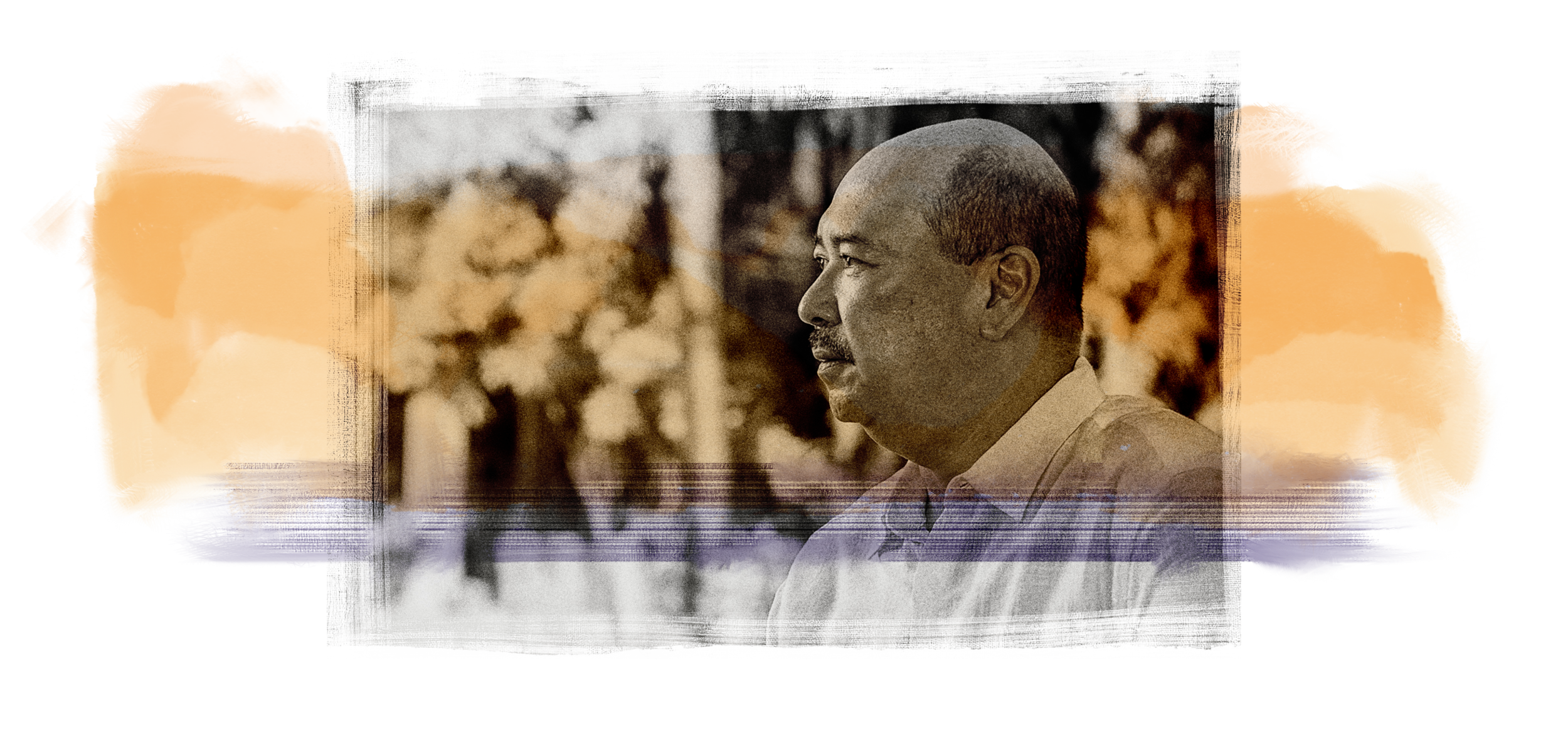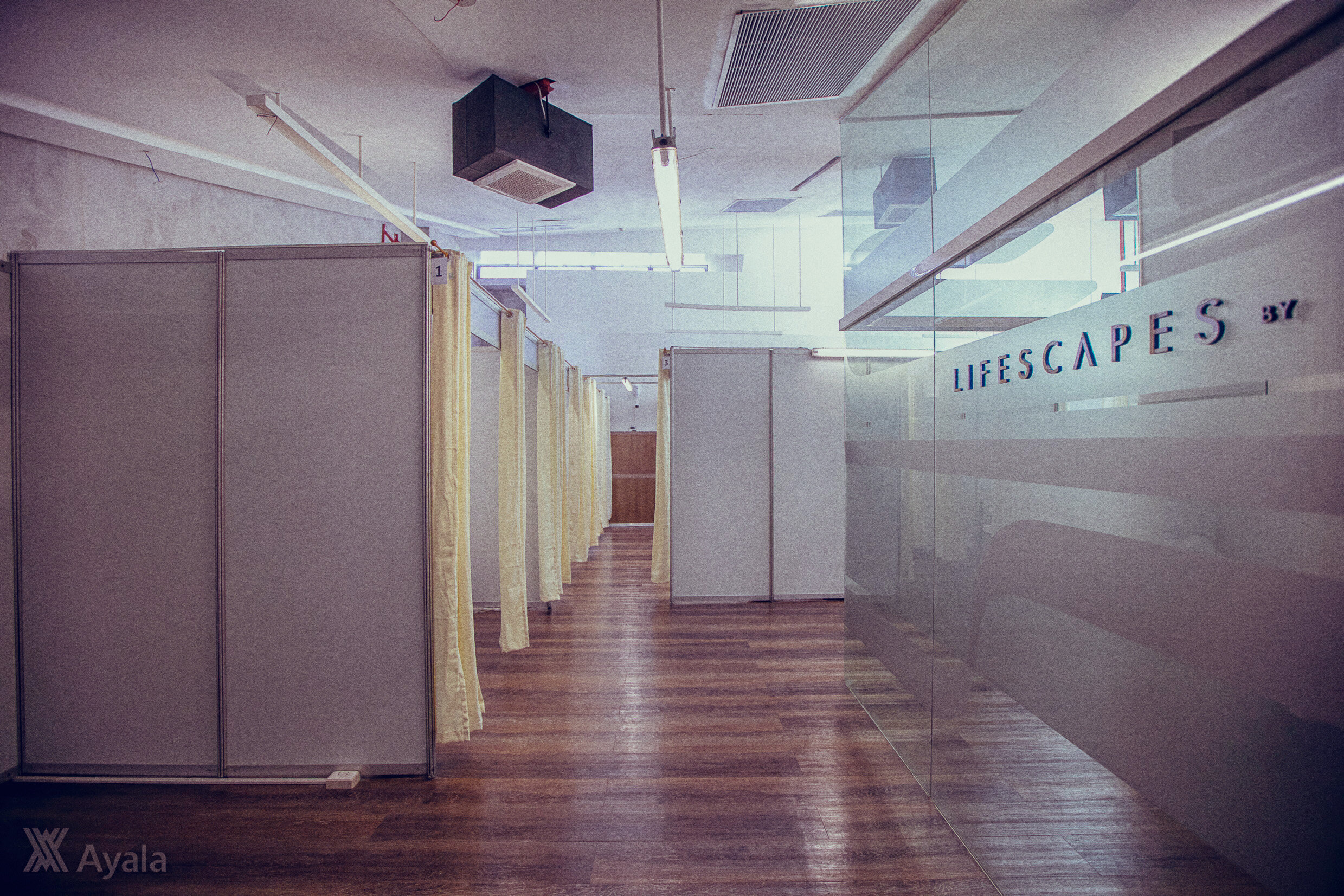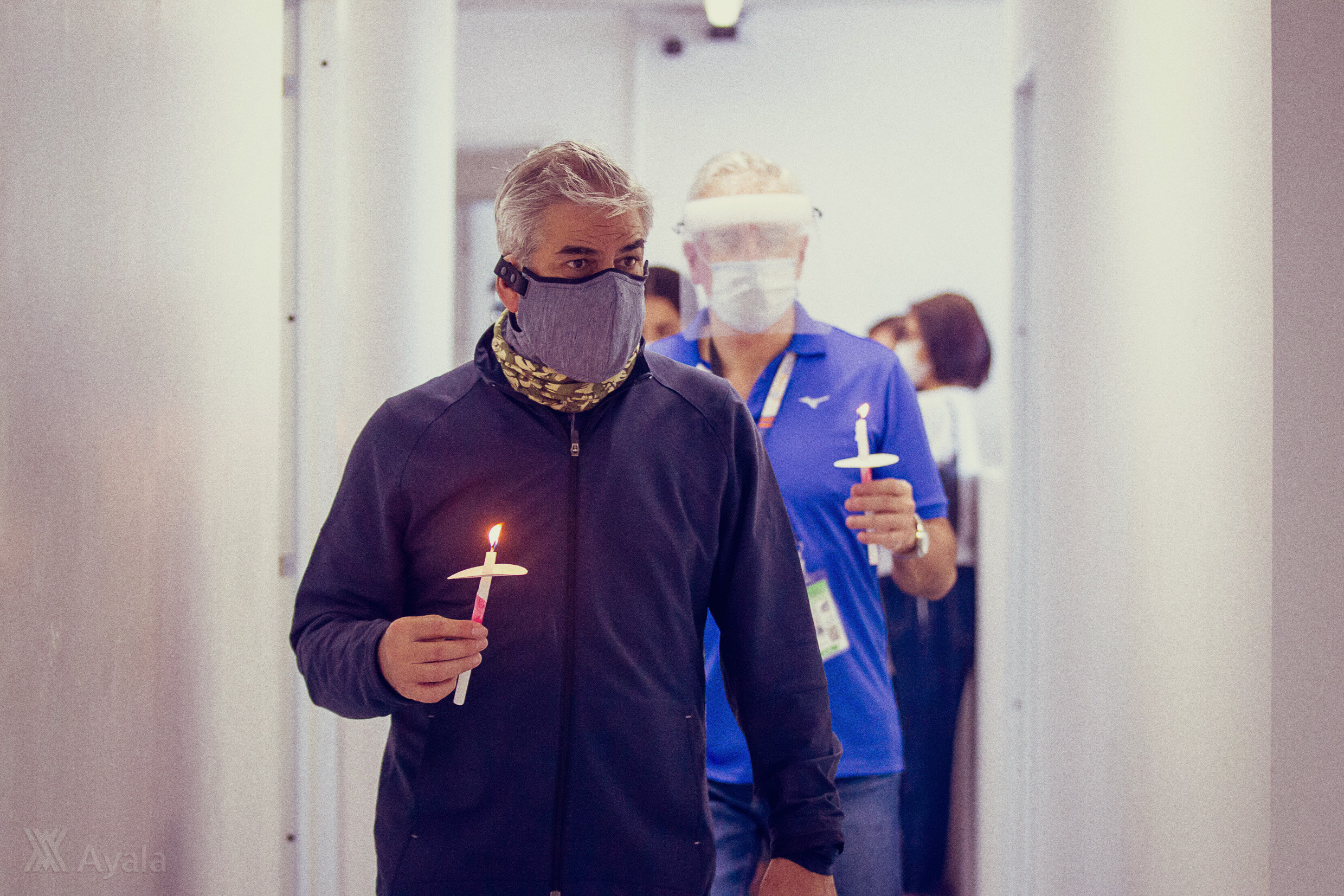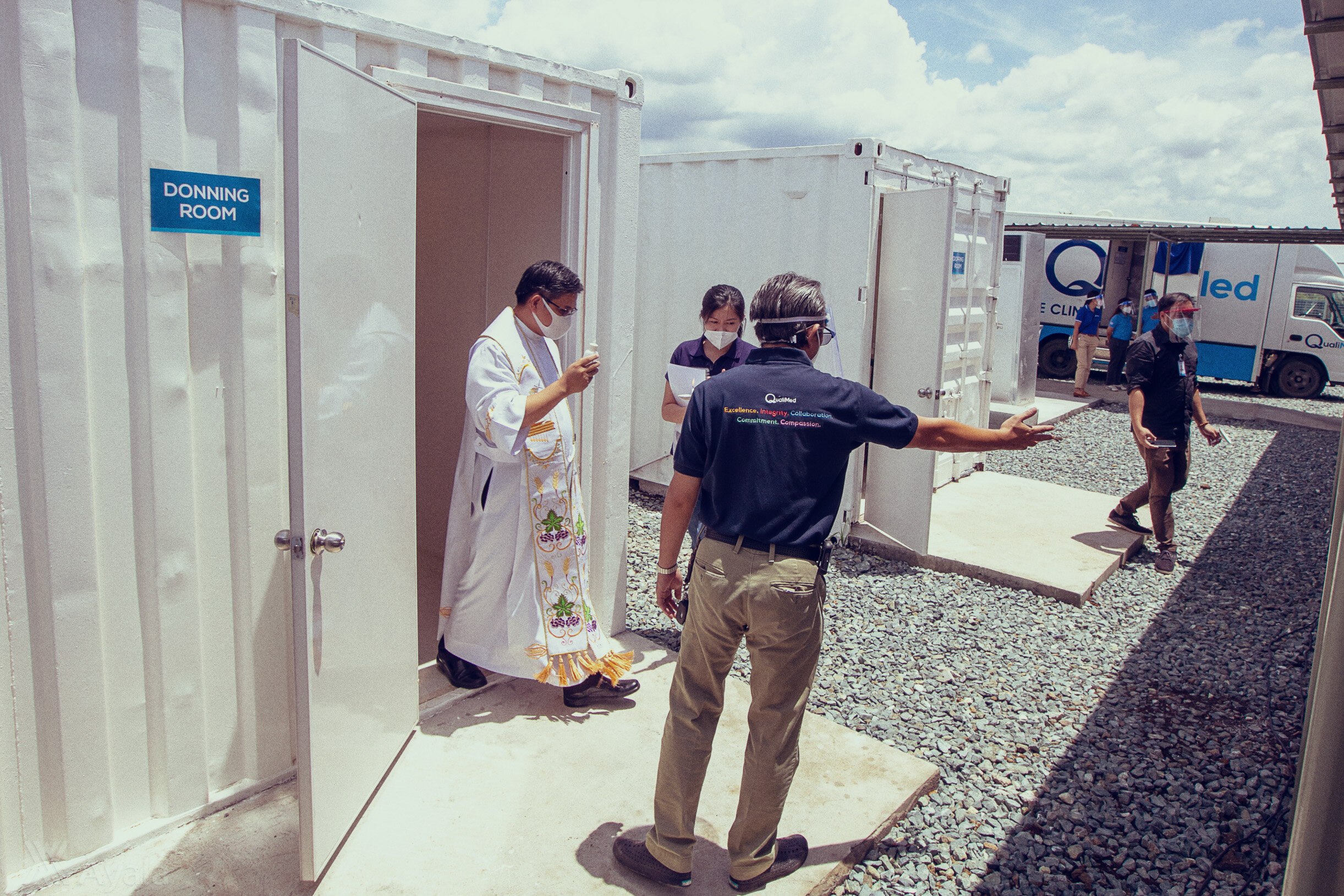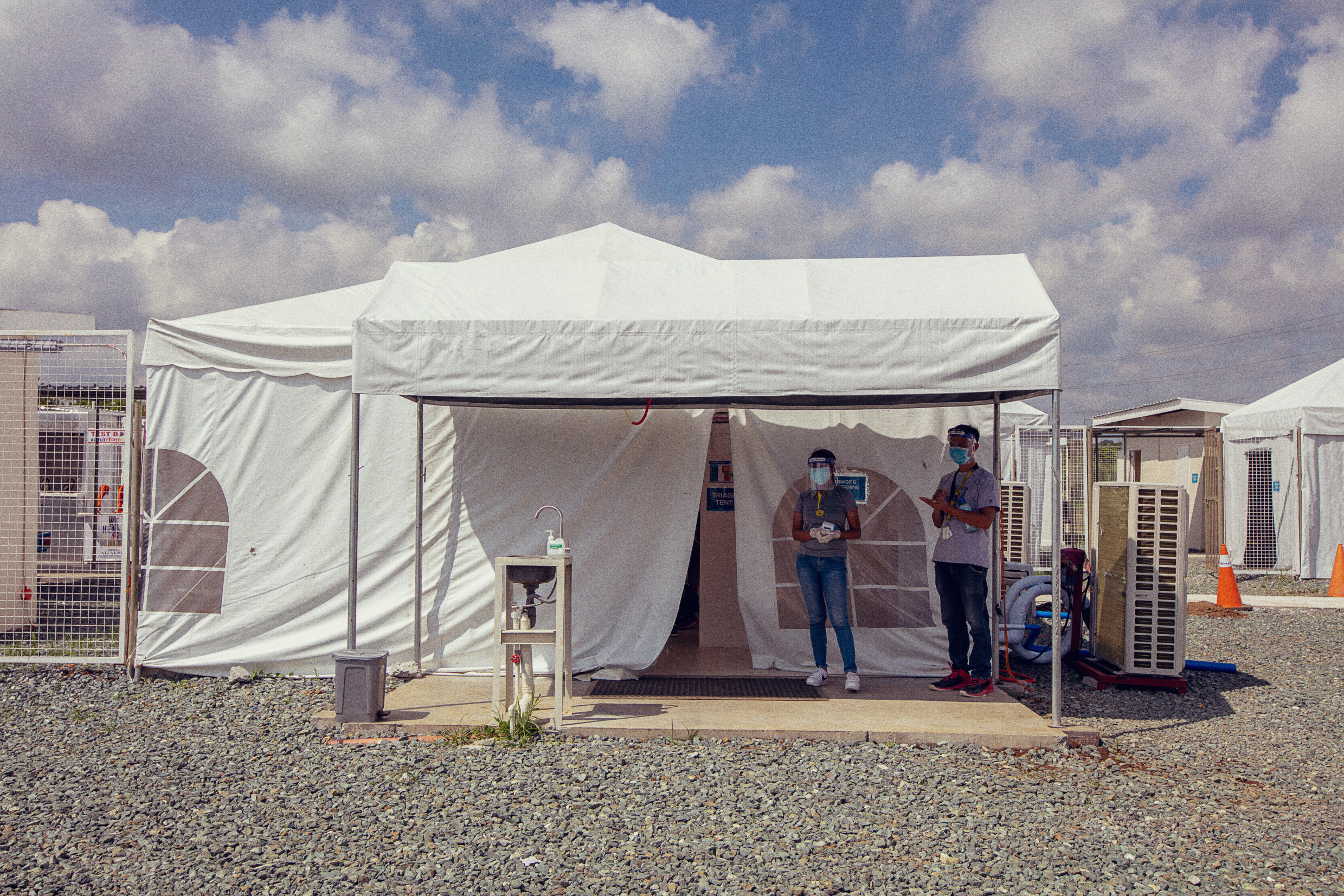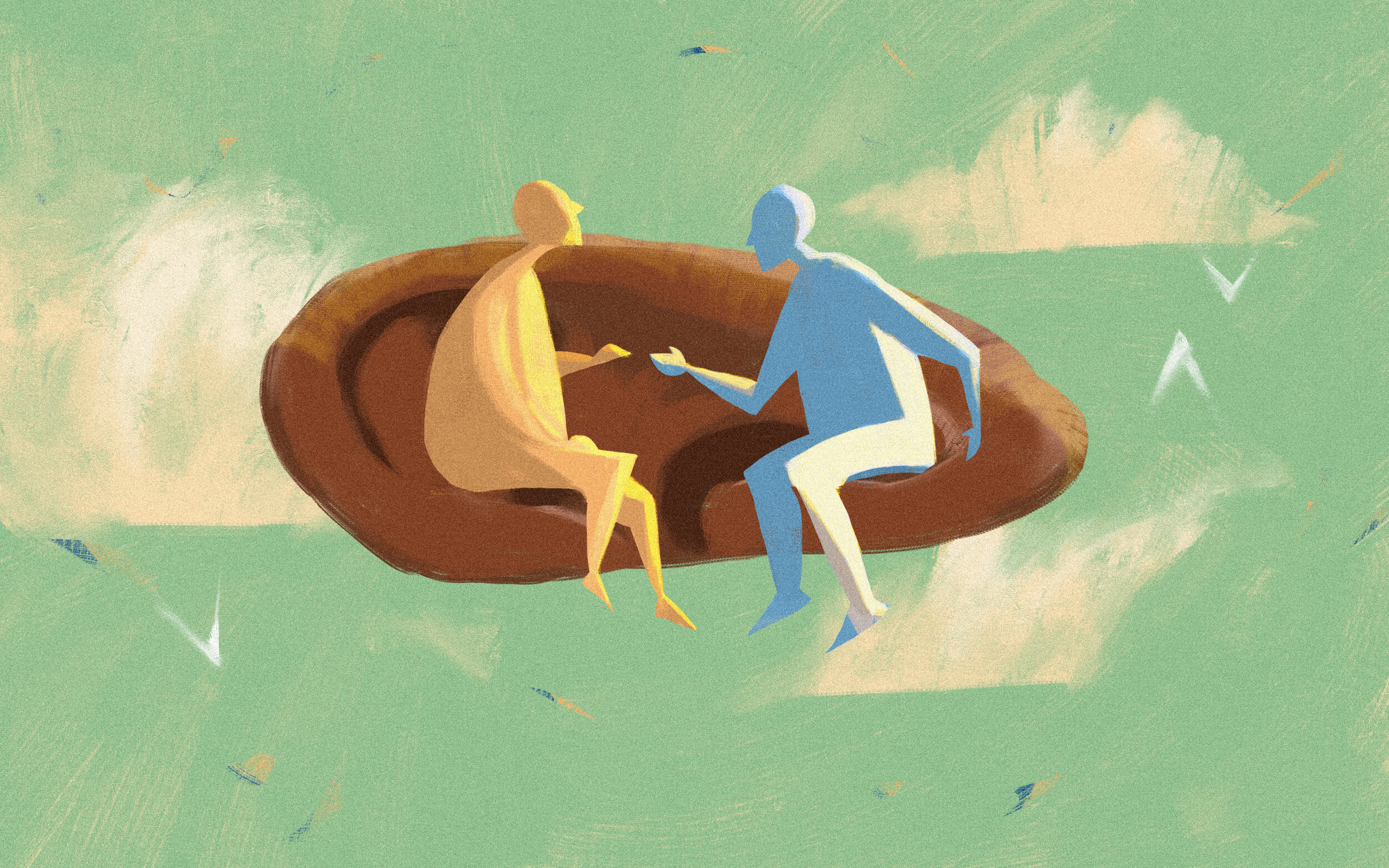Looking After Our Own
Ayala Group leaders linked arms to protect employees, partners, and the most vulnerable among us. JP Orbeta and Paolo Borromeo take us behind the scenes
Words by AN MERCADO-ALCANTARA
The more Paolo Borromeo looked at the numbers, the more alarmed he became.
As head of AC Health, the Ayala Group’s healthcare arm, it was routine to look at the number of cases handled across all FamilyDoc branches and the sales of medicines in Generika branches. Noting the growing number of patients coming to their primary care clinics with flu-like symptoms, and parallel sold-out spikes in vitamin sales from their pharmacies, Paolo, 42, knew he was looking at a canary in the coal mine.
It was early March 2020, just a few days after it was confirmed that a male patient admitted to Cardinal Santos Medical Center in San Juan City was the first case of local transmission of COVID-19 in the Philippines. The number of new cases being reported by the government was still at a low manageable count, the World Health Organization was still hesitating to call the outbreak a pandemic, yet his spreadsheets were confirming his worst fears. Immediately, he reported to the Ayala Group Management Committee. “I remember telling Jaime: ‘This is going to be bad and it's going to be long.’”
He was reporting to Jaime Augusto Zobel de Ayala (JAZA), chairman and chief executive officer of Ayala Corporation, who together with his brother Fernando Zobel de Ayala (FZA), AC president and chief operating officer, were keen to know more about the disease and how it could affect their 58,000 employees across all Ayala companies and all over the country.
““The crisis created a lot of chaos. But we had to step back and rethink everything.””
As early as January, Paolo’s AC Health team had been monitoring news of the spread of the virus. Although AC Health had begun the year ramping up for aggressive growth in 2020—building more clinics and pharmacies, plus an ambitious cancer specialty hospital—tracking the disease quickly became a bigger priority. By the week of March 8, stories of overflowing emergency rooms and packed ICU facilities were creating panic in Metro Manila. “The crisis created a lot of chaos,” recalls Paolo. “But we had to step back and rethink everything. Take a pause to see our way forward.”
The way forward turned out to be a step inward. Facing the possibility of an uncontrolled spread of an unknown disease, Paolo saw clearly that AC Health had to become an internal resource for Ayala employees. “We decided to drop everything and learn as much as we could about the virus, so we could advise the group. We turned ourselves into a central medical team for everybody in the Ayala Group.”
JP Orbeta
Alarmed by a different barometer, Chief Human Resources Officer John Philip “JP” Orbeta also began to shift to crisis mode.
At his regular meeting with his executive committee, which includes the chief HR officers of the largest Ayala businesses — like Ayala Land, Bank of the Philippine Islands, Globe, Manila Water, and Ayala Industrials — anxiety over employees getting infected by the virus loomed large in the discussions. With the welfare of thousands of employees in their hands, JP, 59, felt they had to act quickly and decisively within the best of what they knew back then.
“That early on, we began planning for rotational shifts,” JP explains. “To allow for social distancing, half of the people would come to the office and half would stay home. We already started preparing the week before the government announced the lockdown.” By March 11, it was decided that a well-organized split operations work arrangement was to be rolled out on March 16, Monday.
On the evening of March 12, Thursday, President Duterte announced the imposition of Metro Manila-wide community quarantine. At that point, the number of confirmed cases had doubled to 57 within a week. To curb the spread, land, air, and sea domestic travel to and from the capital would be suspended from March 15 to April 14, 2020. The local government units were to determine the extent of movement allowed within their cities, but already public transport capacity was restricted to half and a 5 AM to 8 PM curfew was set. Driven by uncertainty, the Metro went into a frenzy. On Friday and Saturday, there was panic-buying and hoarding. North and South Luzon expressways were gridlocked with vehicles trying to escape the capital. Bus terminals, sea ports, and airports were jam-packed with people desperate to get out before Sunday morning.
Ayala Ave. under Enhanced Community Quarantine.
“How would people come to work if public transport capacity is to be reduced to half? Will it even be safe to take public transport? ”
While Manila was in chaos, JP and Paolo got together with Atty. Mon Hermosura, AC General Counsel, to review their work arrangement plans vis-a-vis the rapidly unfolding scenario in Manila and the predicted acceleration of the pandemic. They asked: How would people come to work if public transport capacity is to be reduced to half? Will it even be safe to take public transport? And what about those who have immuno-compromised family members, wouldn’t we be putting their family at risk by asking people to come to work?
By Sunday noon, JP sent an urgent email to Jaime and Fernando. “We have always said that our primary concern is the health and safety of our employees,” the email stated. “Given some of the recent developments, we may need to allow managers more leeway in letting employees work from home…. We will make it clear to anyone who feels they are particularly at risk [that they] should ask for an exemption from [work] guidelines from their managers.”
Within a couple of hours, a reply came back from Jaime: “I completely support your proposal and recommendation.”
In so few words, the battle plan was set for Ayala citizens to go on optional lockdown. The announcement was released to employees at 5 PM. It was received with surprise and collective relief. One employee wrote: “I’m really touched with this email…. I can feel the concern. You really care for all of us.”
It wouldn’t be until a full twenty-four hours later that President Duterte, on March 16, announced a Luzon-wide enhanced community quarantine (ECQ), the equivalent of a hard lockdown.
The quick pulling together, swift decision-making, and single-minded focus on the safety of employees in those first few hours of the crisis would characterize many of the crucial decisions that would be made by Ayala management over the next few days.
Jaime Augusto Zobel de Ayala (JAZA) presides over an online meeting.
Day 1 of the ECQ, Tuesday, March 17, shortly before 4:30 PM.
One by one CEOs of Ayala’s major business units and AC group heads clicked on their laptops or phones, and waited for the Zoom screen prompt that would admit them to their first Mancom Daily Huddle. Some had struggles with connecting, but when finally all were in, there were fourteen of them, including Jaime and Fernando, on gallery view. In many ways, the first few seconds were surreal: they were each isolating in the safety of their own homes, yet they were all attuned to the urgency of the gathering. The call for daily meetings meant they were shifting to war footing.
In a crisis, you have to keep a close eye on reality. Paolo shares: “JAZA convenes his management team to get a pulse on how everything is going. It’s really two things: First, we need eyes and ears on the ground, that means relying on the breadth and depth of the people we have out there. Second, we need to use the information to gain foresight and decide on what to do next.”
Within the next 10 days, in rapid succession, decisions were made in these virtual huddles that would affect the lives of their employees, their partners, and the larger community.
“One of the things we had to decide early on is how we can make sure that our 58,000 employees do not feel threatened,” JP says. “Their biggest concern is ‘Papaano ako? How will I make sure that I continue to provide for my family even though there is no work?’
That decision came as a speeding bullet: All employees who could work from home would receive their pay. All those who could not work from home would not need to worry; they would continue to receive their pay during the ECQ. In just seven days, HR presented a master plan which tracked all employees in the frontlines, working from home, sheltering at the workplace, and those unable to do work. But the decision came before computations were made.
“I guess the values of keeping our employees financially secure and feeling that they could withstand something like this was very evident from the beginning,” JP said.
By extension there was also urgent concern over Ayala partners. Ayala Land for instance had a staggering 70,000 construction workers suddenly without work, plus hundreds of security, cleaning staff, and engineers at malls and other properties. JP recalls Bobby Dy, CEO of Ayala Land, saying, “We need to continue to pay them even though the projects stood still.” The CEO Huddle unanimously supported Bobby’s decision, even though these were not employees, technically. There was no question they had to look after their partners as well.
Even the decision to condone rent for mall merchants, which shook up the retail industry because it came so swiftly, came surprisingly easy. There were no lengthy discussions in the huddle. The litmus test was, again, employee welfare. Because they didn’t have to pay for rent, the merchants could now prioritize paying their people.
Everything’s under control. APMC teams monitored the safety and security of all Ayala communities and properties, as well as employees who stayed behind to provide essential services.
Having spent the first few days cushioning the blow within the Ayala group, and making sure business continued safely across units, by the second week of huddles the inevitable question popped up. What can be done for the poorest of the poor — people who were going hungry because they couldn’t go out to work? Instantly, they had to widen their scope of concern.
Before the Mancom Zoom call ended on Thursday, March 19, Fernando said: “Can a few of you stay?”
Bayanihan. A shopper uses a grocery voucher from Project Ugnayan to buy food for her family. Ayala partnered with top companies and worked with LGUs and local parishes to distribute goods and gift checks to the most vulnerable communities. Just three weeks after ECQ was announced, it had already helped 1,522,569 families.
Over the next few minutes, a brainstorming session would lay the seeds for Project Ugnayan, a program that would eventually give 2.8 million families or 14 million individuals in the poorest communities of Metro Manila and parts of Laguna access to food and groceries. By the weekend, through personal phone calls tracked in simple spreadsheets, the Mancom raised a billion pesos for the project. By Easter Sunday, most grocery vouchers had been dispatched by PDRF and distributed in 10 dioceses through the Caritas Manila network.
“The crisis gave us the opportunity to work in different ways,” JP reflects. “To be honest, we really didn’t skip a beat. We just kept going.”
Paolo Borromeo
Paolo could not sleep. It was the wee hours of March 30.
For a couple of weeks now, he had been receiving a daily barrage of messages and calls asking for help—some were seeking doctor referrals, others with severely sick family members were pleading for medication, others more were desperately looking for hospital space. At 3 AM, an urgent message from an Ayala executive beeped through. The husband of one of the group’s CFOs had contracted the virus and needed immediate medical attention, and 13 hospitals in Metro Manila had already turned them down. Where could they go?
Paolo didn’t have a quick answer. “I told Fernando and Jaime that this cannot work,” he says, recalling his frustration. “We need to be able to guarantee the safety of our employees. We need to build our own facilities in a rush, faster than we’ve ever done before.”
The brothers didn’t need much convincing. “The most important thing that Jaime has taught me is that you have to be in control of your own destiny,” he shares. “If our employees are having a hard time getting treatment because we’re relying on other places, then we have to take control.”
Jaime Augusto Zobel de Ayala (JAZA) and Fernando Zobel (FZA) join Bobby Dy, Ayala Land president and CEO, at the Qualimed Auditorium, after inspecting the new COVID-19 facilities put up by the Ayala Group.
““I told Fernando and Jaime that this cannot work. We need to be able to guarantee the safety of our employees.”
Fortunately, Dr. Edwin Mercado, president and CEO of Qualimed, a network of healthcare facilities operated by the Mercado General Hospital in partnership with Ayala Land, Inc., had already pitched the idea of setting up additional COVID-19 facilities in Qualimed Nuvali. Paolo said: “We developed the plan in a week, and once we presented to the Group Mancom, all the CEOs immediately came in to support—ALI, BPI, Globe, MWC, AC Energy—with either funding or suppliers.”
On May 1, only four weeks after that sleepless night, the first phase of Qualimed’s upgraded COVID-19 facilities were opened. “I have never seen ALI and MDC work so fast,” Paolo says. “Now we have ICU facilities for any one of our employees in need.”
Team Spirit.
What worked for the Ayala Management Committee as they faced the crisis together? A strong sense of ownership and accountability, constant communication, and the fact that they really enjoy each other’s company. JP Orbeta says: “Jaime and Fernando had a strong belief in each CEO, and truly empowered them.”
The hospital facility was, in fact, just the top layer in a fortress of healthcare initiatives Paolo and JP had been piecing together to look after the needs of possible COVID-19 positive employees and their family members. The HR Council meetings, as well as AC Health strategy meetings, became vital powwows to piece together a solid health program. “A lot of it was just sharing best practices...and then we shamelessly borrowed from each other,” says JP.
The first tier answered the most basic need: checking on the health of each employee through a set of daily questionnaires, often sent through a software app or Bot developed initially by Globe and then duplicated by AC for sharing.
The second tier was testing. With close to eight thousand employees on the frontlines and the possibility of some 30 thousand more re-entering the workplace on April 15 (when ECQ was expected to end), they decided to do their own testing of employees. In early April, almost all testing was being conducted at the Research Institute for Tropical Medicine (RITM). But Paolo said: “We needed to have our own lab in order to make sure we could provide access to testing for our people.”
After consultations by the AC Health team, a two-step process was planned: first rapid testing would be done and if there was a positive result, a confirmatory PCR test would be done through laboratories that Ayala would set up. In early April, AC Health team member Faye Perez broached the idea of approaching Tropical Disease Foundation, a tuberculosis research lab serendipitously located on property donated by Ayala.
Tropical Disease Foundation’s Laboratory Administrator Anthony Geronimo
“There was this lab in the middle of Makati just waiting to be of help,” Paolo remembers. Built in collaboration with USAID, the United States Center for Disease and Control and other donors, the lab enjoyed a good reputation and could get government accreditation faster because of its existing set up. A partnership was quickly formed and within three weeks, the Ayala Group had brought in the additional machines and assisted in the training of the lab team for its government accreditation as a COVID PCR lab. Over the next few weeks, AC Health would also build an additional 4 new PCR labs in partnership with Qualimed, and have the ability to do 5,500 tests per day. “Ayala was one of the first to say that we would invest in mass testing for our employees and the broader community,” Paolo says.
During the same few days, over a glass of wine to relax after a long day of Zoom meetings, JP and Paolo wondered what would happen to employees who may need to isolate but do not have the means to do so. It was the second week of April and Ayala was already deep into partnership with the government to convert the World Trade Center into a quarantine facility. They both agreed: we should have one of our own. In the daily Mancom huddle, they asked permission to use ALI’s gym facility at the Makati Stock Exchange. Bobby Dy had a better idea: Use the Evoliving Lifestyle Center in Nuvali. “We’re not doing any selling there right now,” he said.
““Ayala was one of the first to say that we would invest in mass testing for our employees and the broader community.””
The Nuvali Evoliving Center was transformed into the Ayala Group Employee Care Center (far left), which together with the transformation of Qualimed Sta. Rosa into a full-scale COVID-19 referral hospital, are core components of the health initiatives designed to look after Ayala employees. On May 16, JAZA and FZA joined the blessing of the new facilities.
A lodging place for Ayala employees needing isolation became the third tier in the fortress. With the help of all Ayala business units, the Nuvali Center was completed in three weeks. (Get behind-the-scenes of its transformation.)
By May, the Ayala Group had built up a formidable line of protection through health protocols and facilities put up for employees. “The threat continues and so much is still unknown,” Paolo says. “But in the mean time we have built a fortress, a stronger wall—more beds, more testing, better prepared people. So while I am still scared because there is still no vaccine, I am more hopeful and confident that we can withstand the threat.” And thanks to the Group’s collective leadership, more Ayala employees can sleep easy at night. #
This story is part of a series on how the Ayala Group sought to protect the health and financial well-being of our employees, partners, and communities. Want more? Check our related stories: Sanctuary, and Ready for Duty.
POSTED 31 JULY 2020




